Spatial Ag Systems | 419-899-4490
7/30/2021
Key Points
- Corn rootworms can evolve and overcome management tactics. Controlling this pest is difficult.
- An integrated approach is key to an effective corn rootworm management program.
- Develop a scouting program that monitors larvae and adult numbers, which predicts potential egg laying and future problems.
- In areas with high numbers of adult corn rootworms, consider incorporating a beetle suppression program that utilizes foliar-applied insecticides.
Corn Rootworm: A Challenging Pest of Corn
Corn rootworm (CRW) larvae and adults cause economic loss every year. The impact of CRW larvae on yield varies greatly depending on:
- The timing of rootworm feeding.
- Available moisture.
- The hybrid’s ability to regenerate damaged roots.
Plants with damaged root systems are more susceptible to drought stress and lodging. Adult CRW feeding on corn silks during pollination can cause poor seed set and subsequent yield loss.
This pest’s ability to evolve has made crop rotation ineffective in many areas. The soybean variant western corn rootworm has evolved to lay eggs in non-corn fields. The northern corn rootworm has shown extended diapause, in which eggs remain viable in the soil for several years before hatching. Additionally, resistant populations have now been documented for all four commercially-available Bt proteins for CRW control.
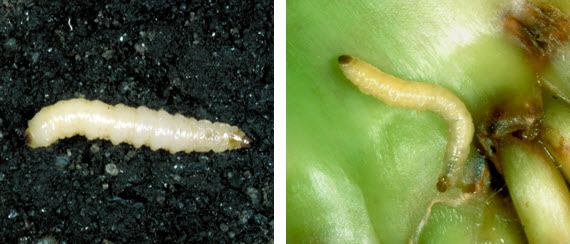
Figure 1. Corn rootworm larvae.
How to Scout for Corn Rootworm Larvae
- Begin in early to mid-June, or when the corn is in the V6 to V12 growth stage.
- Dig up 2 plants at each of 5 locations with the soil from 6” to 8" around the plant. Sift soil over a sheet of black plastic looking for 1/32" to 1/2" long larvae.
- There is no economic threshold for larvae per plant. Some consultants determine the need for emergency controls with an average of 2 to 3 larvae per plant using a visual search, or when 8 or more larvae are found using soil washing.
- If average length of larvae is >½ inch or pupae are found, a rescue treatment may be too late.
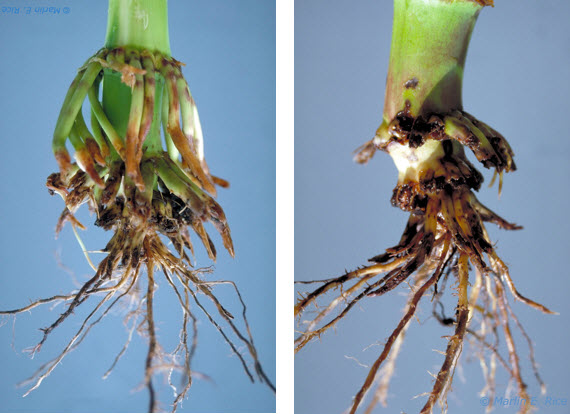
Figure 2. Severe corn rootworm feeding damage.
How to Scout for Adult Corn Rootworm
- The western corn rootworm (WCRW) and northern corn rootworm (NCRW) are the most destructive species found throughout the Midwestern U.S. and Canada.
- Adult emergence begins in early to mid-July with male beetles emerging before females.
- Evaluate fields for silk clipping. If pollination is in progress and the beetles have chewed back the silks so that less than ½ inch of silks is exposed beyond the husks, beetles should be controlled.
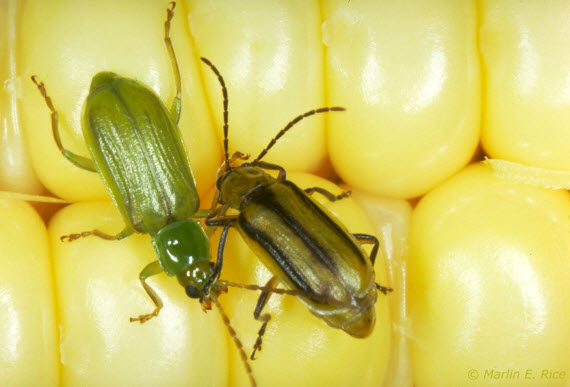
Figure 3. Northern (left) and western (right) corn rootworm beetles.
- To control adults before egg laying, examine 2 plants in 25 locations in the field. Consider an insecticide treatment if the number of beetles averages 0.75 or more per plant and 10% of females are gravid with eggs (abdomen visibly distended with eggs).
- The first beetles to emerge are mostly male, and females require at least 10-14 days of feeding before they can lay eggs.
- Treatments applied too early may be ineffective if large numbers of females emerge after the residual effectiveness of the treatment has dissipated.
- If more than 10% of the adult females within a field are gravid, significant egg laying probably has already occurred, so suppression of adult rootworms will likely not be as effective in reducing larval damage the next year.
- Fields may become re-infested 2 to 3 weeks after an insecticide application; consequently, some fields may require two applications of insecticide to significantly reduce egg laying.
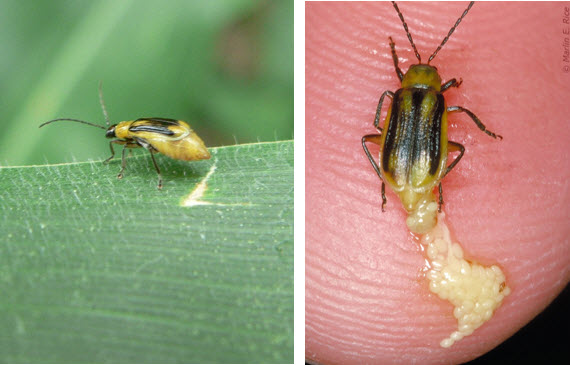
Figure 4. Left: Gravid female western corn rootworm beetle. Right: Western corn rootworm eggs squeezed from the abdomen of a female beetle.
Corn Rootworm Management
A yearly scouting program is the first step to effective management, because corn rootworms can rebuild their populations rapidly. Monitor larvae and adult beetle numbers to predict potential egg laying and future problems. The level of rootworm feeding and beetle activity will determine the best management options. Incorporate several of these options to effectively control CRW with an integrated approach.
"Consider an insecticide treatment if the number of beetles averages 0.75 or more per plant and 10% of females are gravid with eggs."
Crop Rotation
- Can reduce corn rootworm pressure.
- Ineffective in areas with soybean variant WCRW that lay eggs in non-corn fields or variant NCRW in which eggs may remain in the soil for several years before hatching (extended diapause).
Suppress Larval Development
- Use a granular or seed applied insecticide at planting.
- Plant a product with multiple modes of action of control against CRW, such as Optimum® AcreMax® Xtreme or Qrome® products.
- Consider using a CRW Bt-traited product with Poncho® 1250 + VOTiVO® insecticide seed treatment for additional protection.
- Applying a soil-applied insecticide in addition to using a CRW Bt-traited product is not recommended for control of CRW except in limited circumstances. Consult with your Pioneer sales professional, university extension, or other local experts for further guidance.
Control CRW Beetles with Insecticides
- A well-timed foliar insecticide application can effectively reduce gravid egg-laying beetles.
Be sure to alternate modes of action when using insecticides. When using corn hybrids that contain Bt traits for corn rootworm control, it is essential that refuge acre requirements are followed. Failure to comply with refuge requirements and lack of control of adult beetles within the refuge acres will only accelerate the pest’s ability to develop resistance.
Areas with high numbers of adult corn rootworms should consider incorporating a beetle suppression program that utilizes foliar-applied insecticides. This should help reduce the amount of egg laying and potential problems in the future.
Insecticide Treatments
Table 1. Insecticide treatments for adult corn rootworms. Always read and follow product label directions.
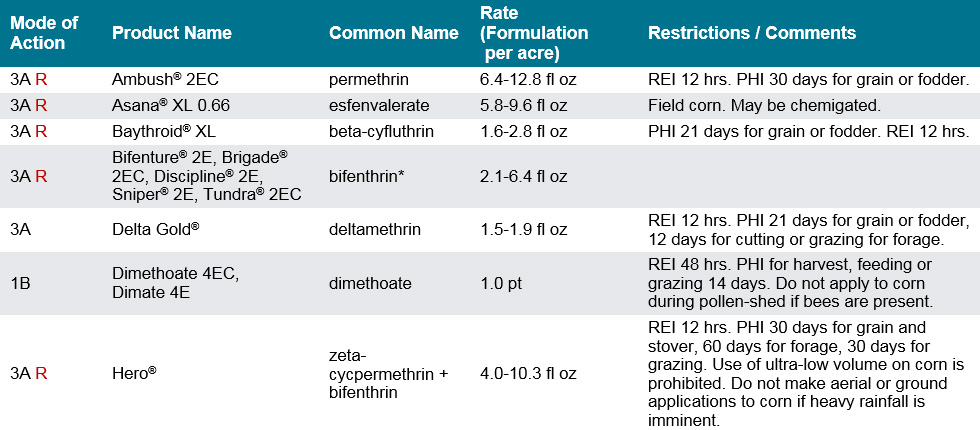
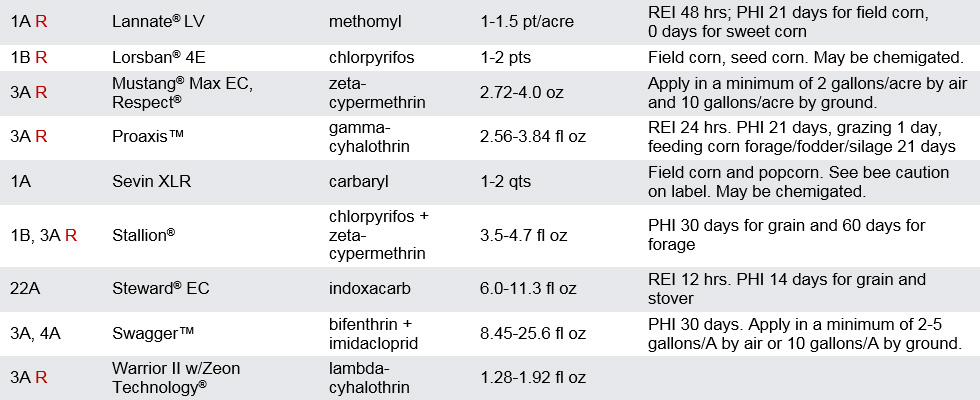
IRAC Mode of Action Classification:
Group 1 = Acetylcholine esterase inhibitors: 1A = Carbamates, 1B = Organophosphates
Group 3 = Sodium channel modulators: 3A = Pyrethroids, Pyrethrins
Group 4 = Nicotinic acetylcholine receptor (nAChR) competitive modulators: 4A = Neonicotinoids
Group 22 = Voltage-dependent sodium channel blockers: 22A = Oxadiazines
R = Restricted-use product
* Resistance to the pyrethroid insecticide bifenthrin has been documented in corn rootworm in southwest Nebraska.







1Data based on average yield advantage in efficacy trials 2019-2020 with moderate to high corn rootworm pressure. Four hybrid backgrounds per treatment per location.
Qrome® products are approved for cultivation in the U.S. and Canada. They have also received approval in a number of importing countries, most recently China. For additional information about the status of regulatory authorizations, visit http://www.biotradestatus.com/. Agrisure® is a registered trademark of, and used under license from, a Syngenta Group Company. Agrisure® technology incorporated into these seeds is commercialized under a license from Syngenta Crop Protection AG. YieldGard®, the YieldGard Corn Borer design and Roundup Ready® are registered trademarks used under license from Monsanto Company. Liberty®, LibertyLink® and the Water Droplet Design are trademarks of BASF. Herculex® insect protection technology by Dow AgroSciences and Pioneer Hi-Bred. Poncho® and VOTiVO® are registered trademarks of BASF.
The foregoing is provided for informational use only. Please contact your Pioneer sales professional for information and suggestions specific to your operation. Product performance is variable and depends on many factors such as moisture and heat stress, soil type, management practices and environmental stress as well as disease and pest pressures. Individual results may vary. Pioneer® brand products are provided subject to the terms and conditions of purchase which are part of the labeling and purchase documents.